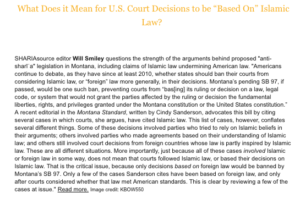
 What Does it Mean for U.S. Court Decisions to be “Based On” Islamic Law? SHARIAsource editor Will Smiley questions the strength of the arguments behind proposed “anti-sharīʿa” legislation in Montana, including claims of Islamic law undermining American law. “Americans continue to debate, as they have since at least 2010, whether states should ban their courts from considering Islamic law, or “foreign” law more generally, in their decisions. Montana’s pending SB 97, if passed, would be one such ban, preventing courts from “bas[ing] its ruling or decision on a law, legal code, or system that would not grant the parties affected by the ruling or decision the fundamental liberties, rights, and privileges granted under the Montana constitution or the United States constitution.” A recent editorial in the Montana Standard, written by Cindy Sanderson, advocates this bill by citing several cases in which courts, she argues, have cited Islamic law. This list of cases, however, conflates several different things. Some of these decisions involved parties who tried to rely on Islamic beliefs in their arguments; others involved parties who made agreements based on their understanding of Islamic law; and others still involved court decisions from foreign countries whose law is partly inspired by Islamic law. These are all different situations. More importantly, just because all of these cases involved Islamic or foreign law in some way, does not mean that courts followed Islamic law, or based their decisions on Islamic law. That is the critical issue, because only decisions based on foreign law would be banned by Montana’s SB 97. Only a few of the cases Sanderson cites have been based on foreign law, and only after courts considered whether that law met American standards. This is clear by reviewing a few of the cases at issue.” Read more. Image credit: KBOW550
What Does it Mean for U.S. Court Decisions to be “Based On” Islamic Law? SHARIAsource editor Will Smiley questions the strength of the arguments behind proposed “anti-sharīʿa” legislation in Montana, including claims of Islamic law undermining American law. “Americans continue to debate, as they have since at least 2010, whether states should ban their courts from considering Islamic law, or “foreign” law more generally, in their decisions. Montana’s pending SB 97, if passed, would be one such ban, preventing courts from “bas[ing] its ruling or decision on a law, legal code, or system that would not grant the parties affected by the ruling or decision the fundamental liberties, rights, and privileges granted under the Montana constitution or the United States constitution.” A recent editorial in the Montana Standard, written by Cindy Sanderson, advocates this bill by citing several cases in which courts, she argues, have cited Islamic law. This list of cases, however, conflates several different things. Some of these decisions involved parties who tried to rely on Islamic beliefs in their arguments; others involved parties who made agreements based on their understanding of Islamic law; and others still involved court decisions from foreign countries whose law is partly inspired by Islamic law. These are all different situations. More importantly, just because all of these cases involved Islamic or foreign law in some way, does not mean that courts followed Islamic law, or based their decisions on Islamic law. That is the critical issue, because only decisions based on foreign law would be banned by Montana’s SB 97. Only a few of the cases Sanderson cites have been based on foreign law, and only after courts considered whether that law met American standards. This is clear by reviewing a few of the cases at issue.” Read more. Image credit: KBOW550
 Country Profile on Bahrain This Country Profile provides a basic overview of the legal history and institutional structures of the Kingdom of Bahrain (Mamlakat al Bahrayn), which is a member state of the Organisation of Islamic Cooperation. This Profile is based on research produced by GlobaLex at NYU Law School and the Library of Congress. Under Bahrain’s Constitution, Islamic law (sharīʿa or fiqh) is a principal source for legislation. Read more. Image credit: BBC/Getty
Country Profile on Bahrain This Country Profile provides a basic overview of the legal history and institutional structures of the Kingdom of Bahrain (Mamlakat al Bahrayn), which is a member state of the Organisation of Islamic Cooperation. This Profile is based on research produced by GlobaLex at NYU Law School and the Library of Congress. Under Bahrain’s Constitution, Islamic law (sharīʿa or fiqh) is a principal source for legislation. Read more. Image credit: BBC/Getty
 Islamic Law in U.S. Courts: Balk v. New York Inst. of Tech (E.D.N.Y. 2013) This case examines whether U.S. Courts are allowed to compel witnesses for violations of U.S. law in Bahrain. The case specifically examines violations of Title VII. This is part of SHARIAsource’s Islamic Law in U.S. Courts series. Read more. Image credit: United States Supreme Court
Islamic Law in U.S. Courts: Balk v. New York Inst. of Tech (E.D.N.Y. 2013) This case examines whether U.S. Courts are allowed to compel witnesses for violations of U.S. law in Bahrain. The case specifically examines violations of Title VII. This is part of SHARIAsource’s Islamic Law in U.S. Courts series. Read more. Image credit: United States Supreme Court
See the full newsletter.

